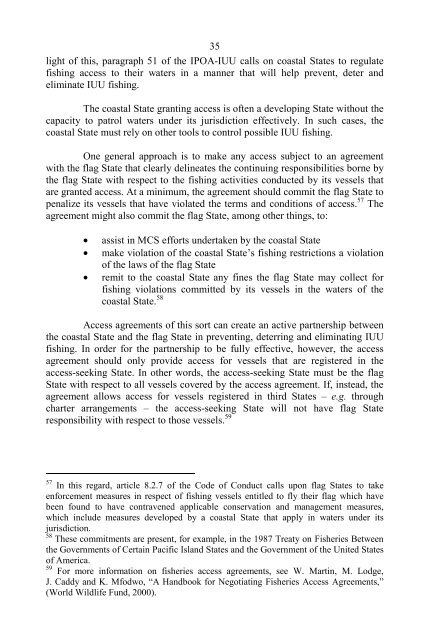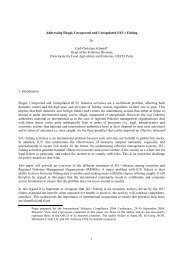Implementation of IPOA/IUU - International MCS Network
Implementation of IPOA/IUU - International MCS Network
Implementation of IPOA/IUU - International MCS Network
Create successful ePaper yourself
Turn your PDF publications into a flip-book with our unique Google optimized e-Paper software.
35light <strong>of</strong> this, paragraph 51 <strong>of</strong> the <strong>IPOA</strong>-<strong>IUU</strong> calls on coastal States to regulatefishing access to their waters in a manner that will help prevent, deter andeliminate <strong>IUU</strong> fishing.The coastal State granting access is <strong>of</strong>ten a developing State without thecapacity to patrol waters under its jurisdiction effectively. In such cases, thecoastal State must rely on other tools to control possible <strong>IUU</strong> fishing.One general approach is to make any access subject to an agreementwith the flag State that clearly delineates the continuing responsibilities borne bythe flag State with respect to the fishing activities conducted by its vessels thatare granted access. At a minimum, the agreement should commit the flag State topenalize its vessels that have violated the terms and conditions <strong>of</strong> access. 57 Theagreement might also commit the flag State, among other things, to:assist in <strong>MCS</strong> efforts undertaken by the coastal Statemake violation <strong>of</strong> the coastal State’s fishing restrictions a violation<strong>of</strong> the laws <strong>of</strong> the flag Stateremit to the coastal State any fines the flag State may collect forfishing violations committed by its vessels in the waters <strong>of</strong> thecoastal State. 58Access agreements <strong>of</strong> this sort can create an active partnership betweenthe coastal State and the flag State in preventing, deterring and eliminating <strong>IUU</strong>fishing. In order for the partnership to be fully effective, however, the accessagreement should only provide access for vessels that are registered in theaccess-seeking State. In other words, the access-seeking State must be the flagState with respect to all vessels covered by the access agreement. If, instead, theagreement allows access for vessels registered in third States – e.g. throughcharter arrangements – the access-seeking State will not have flag Stateresponsibility with respect to those vessels. 5957 In this regard, article 8.2.7 <strong>of</strong> the Code <strong>of</strong> Conduct calls upon flag States to takeenforcement measures in respect <strong>of</strong> fishing vessels entitled to fly their flag which havebeen found to have contravened applicable conservation and management measures,which include measures developed by a coastal State that apply in waters under itsjurisdiction.58 These commitments are present, for example, in the 1987 Treaty on Fisheries Betweenthe Governments <strong>of</strong> Certain Pacific Island States and the Government <strong>of</strong> the United States<strong>of</strong> America.59 For more information on fisheries access agreements, see W. Martin, M. Lodge,J. Caddy and K. Mfodwo, “A Handbook for Negotiating Fisheries Access Agreements,”(World Wildlife Fund, 2000).
















